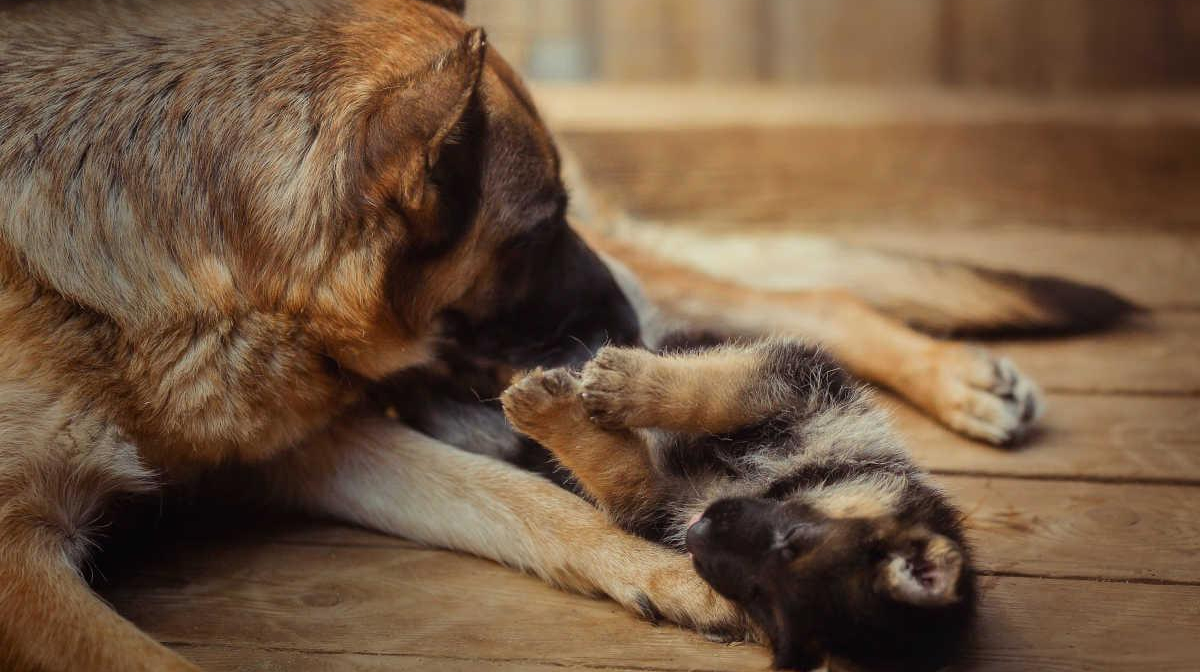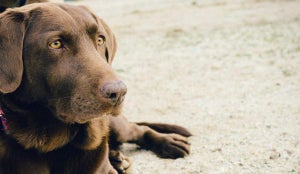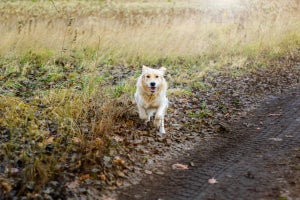
Becoming a dog owner is a significant responsibility and learning to care for your pooch’s health is a serious duty. Health issues in dogs can change with age, so it is important you are aware of their evolving needs throughout their lives.
This James Wellbeloved dog health checker explores how to care for your canine companion throughout their life and any health issues you may need to be aware of at each of their life stages.
CARING FOR PUPPY HEALTH
Puppies are born blind, deaf and unable to regulate their own body temperature for at least the first three weeks of their lives, meaning that they require lots of attention. The puppy life stage lasts until your dog is between six and 18 months old.
You’ll need to monitor your puppy closely, ensuring you feed them the right diet and amount of food. Further, puppies are notorious for their desire to chew things. This is necessary to strengthen their teeth and provide mental stimulation, but you’ll want to provide chew-safe toys to stop them gnawing at your furniture.

VACCINATING YOUR PUPPY
Consulting a vet is crucial at all stages of your dog’s life but is especially important while they are a puppy, as they will need to be given their vaccinations. Inoculations will help keep your puppy healthy and protect them from diseases such as:
Canine Distemper
Hepatitis
Parvovirus
Leptospirosis
DISEASES COMMON IN PUPPIES
You’ll also need regular puppy health checks to ensure they are well cared for. Common diseases to monitor puppies for include:
Intestinal Parasites – parasites that cause gastrointestinal discomfort and symptoms such as diarrhoea
Heartworm Disease – worms passed along via mosquito bites which can cause heart and lung problems. You can protect your dog by giving them a monthly heartworm preventative pill
Coccidia – parasites ingested by drinking water that has been left standing, which causes gastrointestinal irritation and diarrhoea
Hypoglycaemia – when levels of blood sugar fall too low, resulting in lethargy and even seizures. A healthy puppy should be fed up to 4 small meals a day to prevent underfeeding
It is important to remember that there are other diseases that can cause symptoms such as stomach upset or tiredness. If your puppy exhibits any of these symptoms, or you are worried they may have one of these diseases, you should contact a vet immediately for further advice and treatment.
ADOLESCENT DOGS AND BEHAVIOUR
Adolescence is, as for humans, a confusing time for dogs. Between six to 18 months, hormonal changes will begin to occur, with this stage lasting between 18-24 months for small breeds and up to 36 months for large breeds. Many dogs become difficult to deal with in this period, often displaying negative behaviours if not spayed or neutered.
Training is key with adolescent dogs to ensure these negative behaviours don’t become fixed. You should use gentle but consistent methods of training to ensure that your dog grows up with desirable behaviours.
Socialising your adolescent dog is key to training, so that they can become accustomed to the outside world. Taking your pet for walks is the most common method of socialisation, as it allows them to interact with new places and people. This will require patience, as adolescent dogs commonly behave erratically and will be afraid of some of these new experiences, but the long-term benefits make it necessary.

PHYSICAL CHANGES IN ADOLESCENT DOGS
Adolescent dogs don’t only show behavioural changes, but also physical ones. This is the life stage in which your dog will have growth spurts, their permanent teeth will come in and their adult coat will replace their puppy fur.
These changes can cause mild discomfort to your dog, particularly teething – providing them with chew-safe toys can help with this. Growth spurts also mean that your dog’s skeleton is vulnerable to damage in this stage. You should therefore be cautious when exercising them, to avoid harming their fragile growth plates.
LOOKING AFTER DOGS IN ADULTHOOD
After adolescence is over, your dog’s behaviour should settle and all the training you have done with them will start to show. Although this is probably the least demanding life stage for owners, there is still plenty you need to be doing for your pooch. This includes:
Visits to the vet – your pet will need to be taken to the vet at least once a year for a check-up, to ensure they are still healthy and happy
Vaccinations – dogs are susceptible to disease throughout their lives, so will continue to need vaccinations to keep them healthy
Exercise – this is key for keeping your dog fit and providing them with entertainment in every life stage, although the amount they require will change with age
Training – this remains necessary for good behaviour and providing mental stimulation. In this stage your dog is ready to learn more difficult behaviours, such as agility training, which can be highly rewarding for both of you
HEALTH OF SENIOR DOGS
Health problems in dogs are most common in their senior years, however these are often still very happy years for both owner and pet. At advanced ages, dogs tend to be calmer, settled in their routine and at their most affectionate.
Nevertheless, dogs of an advanced age are more vulnerable to numerous health problems. When caring for an older dog you should be aware of these issues, which include:
Arthritis and other joint issues
Dental disease
Incontinence
Dementia and general confusion
Reduced immune system
Reduced organ function
Cancers
Unfortunately, many of these diseases are merely the result of age and currently have no cure. Regular trips to the vet for senior dog health checks are therefore vital, as well as ensuring your dog has a nutritious diet and appropriate amounts of exercise.
So, there we have James Wellbeloved’s dog health checker. If you are concerned about your dog at any stage of their life, you should consult a vet for further advice.










